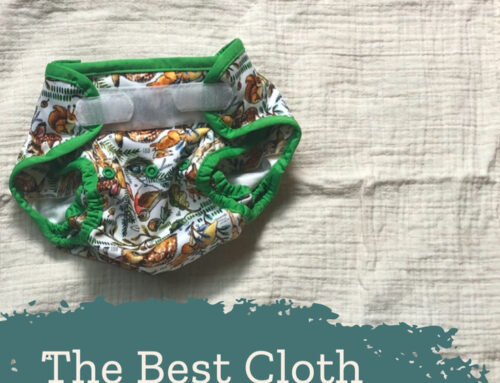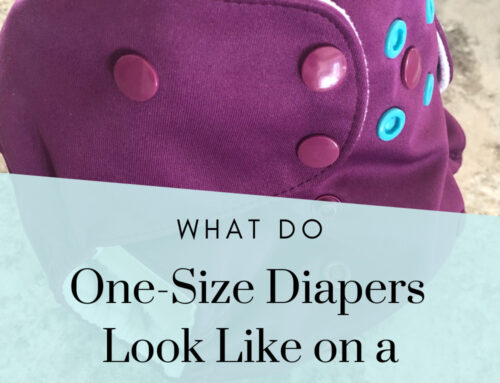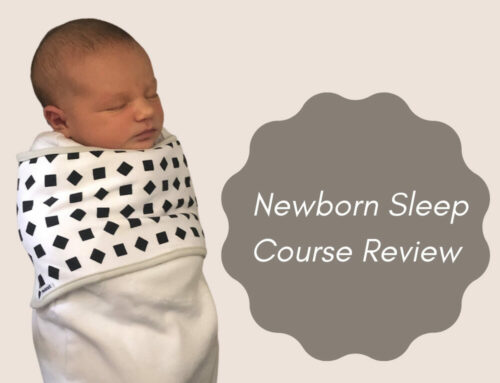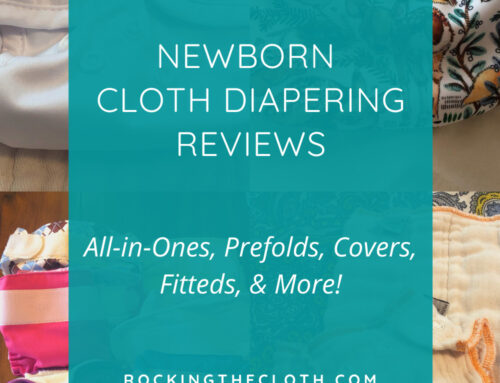In this day and age, it seems like almost any parenting decision is controversial. I also believe our culture is getting more and more sensitive, meaning that if people share a decision they have made and why they chose to do it, other people take it personally as a judgment against those who do something different.
At Rocking the Cloth, I want to empower you to make informed decisions. I pride myself on delivering facts and sharing both sides of the diaper debate. There are some convincing reasons to choose disposables, though as you can probably tell from this site, I believe cloth is the overall better and more responsible choice for my family.
You are probably reading this article because you are on the fence about cloth diapers and wondering if they really live up to the claims that are made about them. Let’s look at some major areas to see which would be the best diaper choice for your family.
Environmental Impact Comparison of Cloth Vs Disposables

Some people argue that cloth isn’t really that much better because of the water and electricity it uses to wash. However, they fail to remember that it takes water and energy to manufacture disposables, too. With all the materials needed to make disposables, it’s estimated that a single disposable diaper used 9 gallons of water in its production. Multiply that 9 gallons of water times 7000….you see what I’m getting at. Considering you aren’t reusing these diapers, that’s an awful lot of water!
Cloth does require water and energy to manufacture, but since you reuse the diapers, you can really minimize that impact. The amount of water required to wash cloth diapers is pretty efficient compared to how much water is used for other products in general. It’s pretty clear that single-use products use and waste more resources in the end. Grovia has some great stats on this.
The only time disposables might be the more environmentally-friendly option is if you live in an area that experiences frequent drought. In that case, you may have other things to consider when making your diaper choices.
All in all, cloth diapers win in this category.
Which Is More Convenient?

However, I do maintain that it isn’t inconvenient to use cloth. It’s just that disposables can be the easier choice in a lot of situations, such as traveling. It is fewer loads of laundry.
However, cloth diapers really only add 2-3 loads of laundry per week. Some people think that is a lot, especially because they may feel laundry is a dreaded chore. But how long does it really take to do a load of laundry? Five minutes? Folding and putting away laundry can be time-consuming, but you don’t really need to do that for diapers. Diaper laundry is the easiest laundry I do.
A big (and judgmental) criticism I hear about cloth is that they don’t want to be doing laundry all day, they want to spend time enjoying their baby. Spending five minutes on a load of laundry 2-3 times a week does not rob you from your baby. It’s a ridiculous statement.
I do believe there is a time and place for convenience. It’s one of the great things about this day and age! However, our culture has gotten carried away with “needing” the easiest option 24/7. That has caused a lot harm, both for the environment and our expectations.
Which Is Healthier?

Other people are alarmed by the chemicals in disposable diapers.
So which is healthier?
Some babies have a sensitivity to the chemicals in disposables, so for those kids, cloth is instantly a healthier choice. For everyone else, I guess it depends on your opinion of the chemicals the diapers contain.
There are a number of chemicals in disposable diapers that have the potential to be toxic, but it is generally agreed upon that the levels of those chemicals in the diapers are too low to cause harm. Some people disagree and are of the opinion that any level of an unnecessary chemical touching their baby is not worth it.
I do believe diaper chemicals are probably safe enough. I am just somewhat wary because we live in a society that is overall pretty comfortable using a number of unnecessary chemicals every day that we don’t fully understand the long-term effects of. Some of the issues connected with the chemicals in disposables are concerning. They are low levels, so we can only hope that they don’t really matter.
Here is an example of the general public being comfortable with something just because it appears safe in the short term: While many “natural” groups have been warning about the issues with BPA in plastics for years, the AAP only just came out this year with an official statement to avoid it (and despite the AAP’s (American Academy of Pediatrics) statement, there are still many groups out there criticizing them for fear mongering! The AAP isn’t a group of hippie doctors! But I digress) and the FDA still isn’t fully convinced. Even though any disposable diaper I’m aware of is BPA free, there are other chemicals in them that some worry are really no better. Are disposable diapers another area in which the convenience of using them makes us downplay some concerns?
When it comes to rashes, some people believe you get fewer rashes with disposables, comparing them to the types of cloth diapers that were used years ago and covered with a plastic pant that didn’t allow any airflow.
Modern cloth diapers are designed to be breathable, which is better for the skin. It is true that disposable diapers do wick moisture away much better, but they don’t allow much airflow. Also, because of how much liquid they can hold, babies regularly are left in a diaper for much longer than they should be. Regardless of the type of diaper, doctors recommend changing every 2-3 hours for best skin health. Many people using disposables do not do that.
As far as cloth diapers being sanitary, that depends on the type of detergent you use and your wash routine. If you choose a recommended detergent for cloth diapers, you will have no problem adequately removing the waste and any germs.
The only way cloth diapers are going to become unsanitary is if you store them in a wet bucket after use (that is an old-school method of storing cloth that is unsanitary, please don’t do it! Use a dry container) or if you use a detergent that isn’t strong enough to clean human waste. If you care for them properly and wash them well, they are perfectly hygienic.
So which is healthier??? It’s a toss up. I think cloth has an advantage, but it depends on your priorities.
Disposables do better wicking away moisture and leaving skin dry, but they don’t allow as much airflow and have chemicals that make some people uncomfortable. Some babies do react to the chemicals in disposables.
Cloth diapers are hypoallergenic (especially if you opt for diapers made from natural fibers) and allow for better airflow. But they do not wick moisture away as well as disposables do. You may need to change diapers more frequently if you use cloth.
Cloth Diapers Vs Disposables Diapers Cost

Note: Prices vary depending on store and location. Disposable diaper costs per diaper usually go up as the sizes get bigger, too (meaning you might see that they look the same price, but the packages usually have fewer diapers in them as the sizes go up). To get an average price, I will use size 3.
Disposable Costs
Aldi Little Journeys— $10.99/100 diapers (this is the price in my area for the size 3 box). This averages out to $0.11/diaper. We will assume the baby uses 6 to 8 diapers per day.
Per day: $0.66-$0.88
Per year: $241-$321.
Until potty training: The average child potty trains at age 2.5, so total diapering cost would be about $602 to $802.
That is a pretty good price for disposables, and from what I’ve seen it can’t be beat, but that assumes you use the Aldi brand and that they work well on your baby.
Luvs is priced similarly–I see a size 3 box for sale for $29.45 at Walmart that included 198 diapers. That would be just a hair under 15 cents/diaper.
Per day: $0.90 – $1.20
Per year: $328 – $438
Until potty training: $820 – $1095
Huggies size 3 goes for just a smidge over $0.15/diaper, so it’s stats are very similar to Luvs.
Those three brands are considered “cheap” brands, which also means many people don’t like them. I used disposables during the newborn days with one of my kids and for a week or two with the other, and none of these brands contained their pee. Many leaks and poop blowouts, too. We ended up having to go for Pampers. Not everyone shares my experience, though, and loves these brands. Each baby is different.
For comparison’s sake, let’s look at some higher-end diaper prices:
Pampers size 3 goes for $0.32/diaper at Target and $0.36/diaper on Amazon. Using the cheaper price:
Per day: $1.92 to $2.56
Per year: $700 to $934
Until potty training: $2,336
Babyganics size 3 goes for $0.33/diaper, making it’s price comparisons similar enough to Pampers that I won’t bore you with them. I will just say that in the end, they cost $73 more by potty training (see how much even one single penny can make??)
The best price I found for Honest Company size 3 diapers was $0.38/diaper at both Target and Amazon.
Per day: $2.28 to $3.04
Per year: $832.30 to $1109.60
Until potty training: $2080.50 to $2774
Okay! Now it’s time to price compare cloth diapers. Just as I didn’t compare prices for every disposable diaper brand on the market, it would difficult to price compare every single brand of cloth. I will choose some of the most well-known brands for different price brackets.
Cloth diapers also vary from disposables in that there are many styles, not just one type. Price comparing gets muddy there. If you’re interested in seeing some of the most cost-effective cloth diapering systems, check out this post for some great suggestions and stats.
These price comparisons will also be for 24 diapers–you can get by with as few as 16-18 if you want to wash more often, and some people have more than 24, but 24 is a pretty average amount.
I am also going to add a general $50 for the low end diaper accessories (wet bags and pail liners), $75 for medium, and $100 for the high-end brands, assuming your brand loyalties extend to the accessories.
I will use an average price of $0.12/load for laundry detergent. Detergent prices vary greatly, especially between brands and retailers. I wish I could factor in electricity and water, but there are far too many variables.
Here is a website where someone averaged out their bills and compared pre- and post-cloth diapering laundry expenses. The synopsis is some months her overall cost (water and electricity combined) was higher by about $6, some months higher by as much as $11, but other months she actually was down by $9 and somehow saved money!
All in all, it probably does add a few bucks per month, but there are so many variables that there isn’t a consistent cost, and it’s hard to know what you can blame on the diapers versus using more energy and water in general because you added another person to your household— that will raise your bills no matter what. You use water for more than just diapers when you have a baby! You’re also washing more sheets, more clothes, giving more baths, etc.
For each diaper’s total price, you can add in an amount for newborn diapers if you wish–sometimes one-size diapers do not fit right away and you need to wait a couple months. Most babies start to fit in them well once they are 10-12 lbs. I had 6 lb babies, and they were wearing one-size by two months old.
You can factor in a bit extra to cover water and electricity if you want. I can’t give exact numbers because of the variables I described above.
All that said, here are some price comparisons!
Cloth Diaper Costs
Alvas are one of the most well-known and frequently purchased cheapie pocket diaper. Directly from the Alvababy website, they cost about $4.79/piece and about $5/each on Amazon (again, prices change at any time). I will use the cheaper price for these calculations.
For 24 diapers: $114.96
Accessories: $50
Laundry from birth to potty training: $31.20 (based on 2 loads a week) to $46.80 (3 loads)
Total Cost: $196.16 to $211.76
You can add what you think is fair for energy/water costs if you wish. For newborn diapers, you can attempt using one-size diapers from the get-go, or if your baby is too small and you follow my recommendations here and here, you can add in $100 for a modest cloth diaper stash. The laundry cost already covers the first couple months, so you don’t need to add anything there.
That brings your total to roughly $300 from birth to potty training with Alva diapers.
Imagine Baby pockets go for about $13.95/each.
For 24 diapers: $195.30
Accessories $75
Laundry: $31.20 to $46.80
(optional) Newborn stash: $150 for mid-range newborn diapers
Total Cost: $301.50 (or $451 with newborn) to $317 (or $467.10 with newborn)
BumGenius 5.0 pockets go for about $19.95/each.
For 24 diapers: $478.80
Accessories: $100
Laundry: $31.20 to $46.80
(optional) Newborn stash: $200 for a reasonable number of high-end newborn diapers
Total Cost: $610 (or $810 with newborn) to $625.60 (or $825.60 with newborn).
And the winner is???

You can save even more money with cloth by selling your stash of diapers when you are done using them (yes, there is a big market for used diapers). But with disposables, you are literally paying money to throw something away. Not only that, but you are paying hundreds, if not thousands, for the illusion that you won’t ever have to deal with poop.
Newsflash: You will be dealing with poop no matter what. My sister just had a baby. She is using disposables, and deals with a blow out almost every day. Blow outs mean poop is everywhere. Blow outs almost never happen with cloth. The elastic around the waist and legs prevent it the way disposables can’t. Doesn’t mean it will never happen–all kids have a doozy of a diaper once in awhile, but blowouts are much more common with disposables.
Which Is Right For You?
I hope you found this in-depth look at cloth diapering vs disposable diapers helpful. Obviously, I am partial to cloth. But disposable diapers are the mainstream way to go for a reason, so I did my best to objectively state the facts to help you make an informed choice.
If you have babies at home, do you use cloth or disposables? If you don’t yet have babies at home, which would you choose? Let me know in the comments!




This was a very detailed analysis between cloth nappies and disposables. I do agree that cloth is probably better but because I work full time, it is hard to manage the cloth nappies or expect someone else to deal with them. My son is potty training now so with the pull ups he can go to the bathroom by himself and change his own diaper most of the time. And it gives him more independence.
Hi Jenny! It can seem like “one more thing” to worry about when you work full time. I worked full-time until just a few months ago and we managed pretty well without a lot of extra work or stress over it. If you are interested in some tips for using cloth diapers when you’re child goes to daycare, Cloth Diapers at Daycare – Getting Your Provider on Board with Cloth.
You’ve included a tremendous amount of research in this article. I certainly wish this had been available when my daughters were babies. It’s been years since my girls were in diapers, but I still remember trying to balance out the pros and cons of cloth versus disposables. Cloth was always my choice, mostly because of skin sensitivities. One of my daughters had very sensitive skin and just did better in cloth. One point that may not be an issue today is the fragrance that was used in disposable diapers at that time. I had allergies, and couldn’t handle the scents of some of the brands. Deciding which to use was also dictated by where we lived. We lived in Europe for most of the time one of my daughters was in diapers. With no washer or dryer in our apartment, and the prospect of transporting soiled diapers to the laundromat by taxi, disposables won the contest. Even under those conditions, your article should be a great help to moms and dads faced with the cloth versus disposable question.
Thanks Nancy! I’m glad you found it helpful! I agree with you about disposable scents–I do think they are less of an issue overall now, but I still don’t really like the smell.
It would be so difficult to use cloth without consistent access to laundry facilities, that’s for sure!
I’m currently doing a mix of cloth nappies and disposables. When I’m going out for more than a couple of hours, I’ll usually use a disposable and for overnight as well. And when we were away on holidays I used disposables too. I’m trying to get the best of both worlds I guess. When I have to go back to work, I imagine that my cloth nappy usage will diminish once my son is at daycare. Though I see on one of the other comments that you have an article about cloth nappies at daycare which I will have to read. Thanks for your article!
Glad you found it helpful, Fiona! I definitely agree that it doesn’t have to be all or nothing, and I’m all for families using cloth part-time if that’s what works for them! Any cloth diaper used makes a difference!
I’m a new mum and I have an eight month baby. I prefer disposals vs cloth diapers as well. They aremore convenient then cloth diapers for all the reasons you have already stated. They are easier to use and to tell the truth I don’t want to overcomplicate my busy mum life, even with 15 minutes more during the week. Another reason is that I think that the laundry will get a poop smell, I know it may happen, because even when I wash dirty clothes with poop, after the laundry cycle, the smell coming from the wash machine it’s not so good.
Hmm, that’s interesting Leo! I’ve never had a poop smell in my laundry. You might want to check that you’re using a good detergent (and enough of it) and using enough water.
Glad you found a system that works for you.
I’m a total fan of cloth diapers. There are so many reasons why we should use reusable cloth diapers instead of disposable synthetic diapers.
Just think of the number of diapers thrown away every day. Maybe 3 per baby and day, I don’t remember, maybe more.
Millions of babies are using diapers for many months, 7000 of them you say, that get’s tons of waste, thousands of tons.
One day we will walk on disposed diapers lol.
Hi Stefan! I agree, the numbers are staggering. I know many pro-disposable diaper people say that diapers are not that much waste compared to all that we throw out. I’m not sure how that’s supposed to make me feel better about throwing out diapers, though….instead it just makes me alarmed at how much OTHER stuff we really are throwing out every day! It’s crazy.
Hmmm $2334 costs for Pampers until potty training? this is a price of a car, its just but too much.
We usually buy pampers for our little daughter, that’s why I am more concerned of the total costs of pampers until the age of potty training and your price really matches our local retail prices.
Surely, cloth diapers are far better than disposable. I think its more economical to buy disposable diapers, only when you want to travel or on special occasions.
Thank you so much for a great article
Glad you found it helpful! I agree, it’s shocking how much it all adds up to in the end. I kind of think of it as what a nice vacation could cost–if you put it like that, would more people rather be able to go on a nice vacation after saving for a couple years? Or is the convenience of a disposable diaper worth that sacrifice? Everyone’s answer will be different, but it’s something to think about. Obviously, I don’t mind a bit of extra work here and there to save some money, but other people really would rather pay for convenience.
Thanks for this! Great calculation between the use of cloth diapers and disposable diapers. I know what was right for me. I used both. The first 3-4 months I used with all my children cloth diapers (I have 6). One thing is a must! A top loading washing machine. I rinsed out the cloth diapers, and put them in a bucket with a bit of laundry detergent. When the bucket was filled, I tipped the diapers in the top loading machine, just pumping and then turn on the washing machine, that is not possible with a front loader. After 3 months, I choose for the disposable ones, just because the amount of urine became too much for the cotton diapers. Lovely to read, and it brought me back through memory lane.
Loes
Glad it brought you down memory lane! Top loaders are considered much easier to use for cloth diapers, that’s for sure! Things have changed a lot with laundry recommendations for cloth diapers, too, so with what we know now about good washing practices, people rarely deal with any of the issues that people used to deal with. I bet that would help with all the urine you were struggling to remove!
Dear Holly,
Thanks a lot for the helpful comparison on Cloth Diapering Vs Disposable Diapers.
As always I enjoy reading your articles. We are expecting a baby soon so your posts means a lot to us and we got great insights from your posts.
Thanks a lot for the detailed and in-depth comparison, really helpful.
We will go with the winner – Cloth Diapering! Yes its saving money that’s the by-product the first thing is as you discussed we are not happy with chemicals in disposable diapers. Thanks for informative post.
Wishing you great success!
Paul
Awesome, Paul! So glad you found this helpful. 🙂 Congrats on your little one on the way!